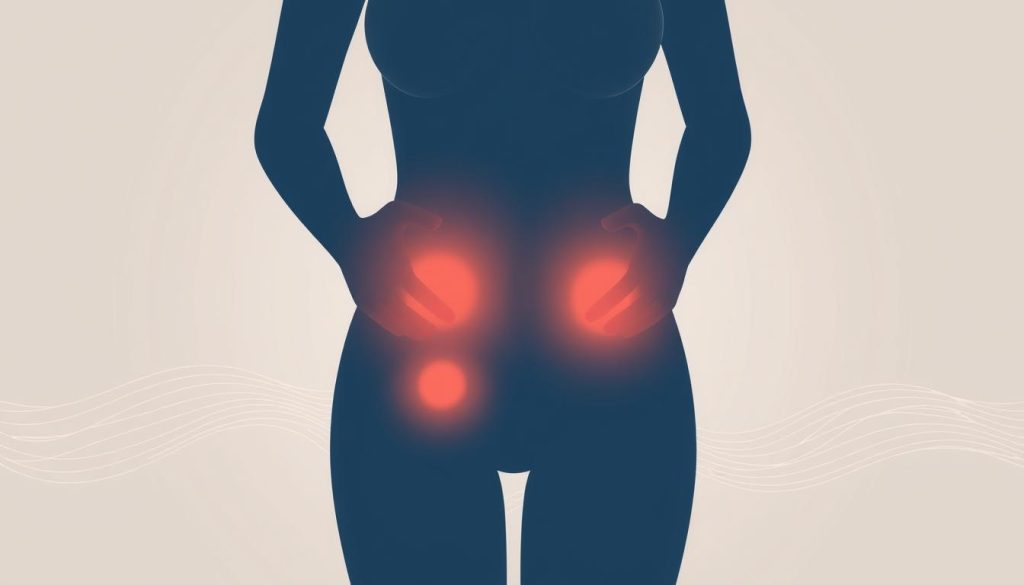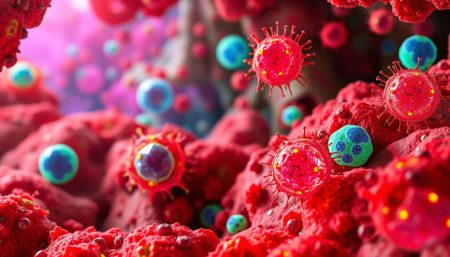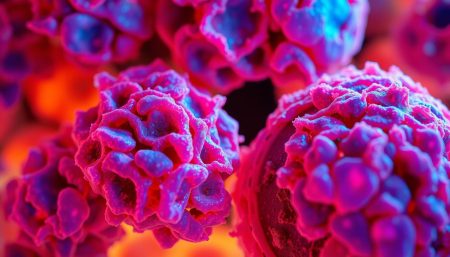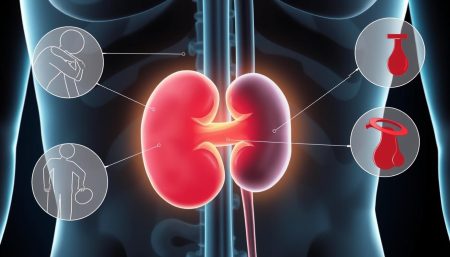Being aware of our body’s signals is crucial for our health. Especially with ovarian cancer, catching it early can make a big difference. This article will help you spot the early ovarian cancer signs that are often hard to notice. By knowing these signs, we can take care of our health better.
Key Takeaways
- Early signs are vital for ovarian cancer detection and treatment.
- Being aware of bodily changes can lead to proactive health measures.
- Recognizing subtle symptoms is key to getting timely medical attention.
- A comprehensive understanding of symptoms supports greater health awareness.
- Empathy and education are central to supporting those at risk for ovarian cancer.
Understanding Ovarian Cancer
Ovarian cancer is a serious health issue for women worldwide. It’s crucial to focus on early detection and diagnosis. This section will give you a detailed look at ovarian cancer, its types, and stages. It shows why finding it early is key to better treatment.
What is Ovarian Cancer?
Ovarian cancer starts in the ovaries, which are part of the female reproductive system. They produce hormones and store eggs. There are different types of ovarian cancer, each with its own characteristics. Epithelial tumors are the most common.
Why Early Detection is Crucial
Finding ovarian cancer early can save lives. The survival rate is much higher if caught early. For example, early detection can lead to a 94% five-year survival rate. But, if it’s caught late, the survival rate drops to about 30%.
This big difference shows how important it is to find ovarian cancer early. Doctors need better ways to detect it early. This leads to better treatment and outcomes for patients.
| Stage of Detection | 5-Year Survival Rate |
|---|---|
| Early (Stage I & II) | Up to 94% |
| Late (Stage III & IV) | Approximately 30% |
It’s vital to raise awareness about ovarian cancer symptoms. Regular medical check-ups are also important. Improving detection technologies is crucial too.
Getting an accurate diagnosis early can save lives. It also improves the quality of life for those with ovarian cancer. It gives hope to those facing this tough disease.
Ovarian Cancer Symptoms Overview
Understanding the common symptoms of ovarian cancer is key for early detection and treatment. The challenge in identifying ovarian cancer is its symptoms are often mild and similar to other conditions. Here’s a quick overview to help you understand each symptom better in the next sections.

- Bloating and increased abdominal size
- Persistent pelvic or abdominal pain
- Difficulty eating or feeling full quickly
- Urinary symptoms such as urgency or frequency
- Change in bowel habits, such as constipation
- Unexplained fatigue or low energy
- Menstrual irregularities or postmenopausal bleeding
- Back pain not relieved by standard measures
This list is a starting point to check if you or someone you know might have ovarian cancer symptoms. Spotting these common symptoms of ovarian cancer can lead to quicker medical check-ups. This could help in catching ovarian cancer early.
Recognizing the Signs: Pelvic Pain
Pelvic pain is often seen as a normal discomfort for many women. But, in the case of ovarian cancer, it’s a big warning sign. Knowing the signs of pelvic pain from ovarian cancer can help you decide when to see a doctor.
Characteristics of Pelvic Pain Related to Ovarian Cancer
Pelvic pain from ovarian cancer is different from usual menstrual cramps. It’s a constant, dull ache that can sometimes feel sharp. Unlike normal cramps, this pain doesn’t go away with over-the-counter meds. Spotting these differences is key to catching it early.
When to Seek Medical Advice for Pelvic Pain
See a doctor if your pelvic pain is new, gets worse, or lasts a long time. If you also notice bloating, changes in bladder habits, or weight loss, it’s even more urgent. These signs could mean something serious like ovarian cancer. Getting help early can lead to better treatment and outcomes. Knowing when to go to the doctor is crucial for your health.
The Subtle Warning of Bloating and Abdominal Swelling
Bloating and swelling in the belly are often seen as minor issues. But, if they keep happening, they might signal a bigger problem like ovarian cancer. It’s important to know the difference between normal bloating and signs of ovarian cancer to catch it early.
How Bloating Can Be a Sign of Ovarian Cancer
Ovarian cancer bloating is not just a minor issue. It’s a symptom that keeps coming back and feels different from usual stomach discomfort. This bloating often comes with other signs like changes in bathroom habits or pain in the pelvic area. It can also make your waistline feel tighter as your belly grows.

Distinguishing Normal Bloating from Persistent Symptoms
Figuring out if bloating is normal or a sign of ovarian cancer takes watching how often, how long, and how bad it is. Normal bloating usually comes from what you eat and goes away easily. But, bloating from ovarian cancer keeps coming back and doesn’t get better, even with diet changes.
This kind of bloating might seem minor but is actually very serious. If you’re experiencing it a lot, seeing a doctor is crucial. Catching ovarian cancer early is key to treating it effectively.
Unexplained Fatigue and Its Links to Ovarian Cancer
Fatigue is often seen as just part of a busy life. But when it’s persistent and severe, it can be a warning sign. In the case of ovarian cancer, knowing the difference between normal tiredness and fatigue ovarian cancer symptom is key. This exhaustion doesn’t go away with sleep or rest, making it a red flag for ovarian cancer.
Talking about ovarian cancer exhaustion means more than just feeling tired. It’s a deep tiredness that makes everyday tasks hard and lowers your quality of life. It’s vital to notice if your fatigue is more than just a long day. It could be your body’s way of telling you about a serious health problem like ovarian cancer.
- An unrelenting feeling of tiredness not alleviated by rest.
- A noticeable reduction in energy levels affecting daily activities.
- An overarching sense of weakness or exhaustion without a discernible cause.
Fatigue can start slowly, making it easy to ignore at first. But as ovarian cancer gets worse, the tiredness gets stronger. This shows how important it is to listen to your body and get medical help when you notice changes.
It’s essential to consult healthcare professionals if you experience persistent fatigue along with other symptoms like bloating, pelvic pain, or changes in urinary habits. This multifaceted approach can lead to early detection, which is crucial for effective treatment outcomes.
In conclusion, seeing fatigue ovarian cancer symptom and ovarian cancer exhaustion as serious signs, not just from being busy or getting older, is crucial. Pay attention to persistent fatigue. It might be your body’s way of telling you about a bigger health issue.
Decreased Appetite and Early Satiety
Changes in eating habits are subtle signs of ovarian cancer. These include feeling less hungry and getting full quickly. These signs are important because they show how ovarian cancer can affect our bodies.
Navigating Changes in Eating Habits
Changes in eating habits can start with feeling full sooner or not wanting to eat as much. It’s important to see these as signs, not just changes in taste.

It’s key to understand changes in eating patterns. It’s not just about eating less. It’s about knowing why you’re not hungry. Here are some tips to handle these changes:
- Small, frequent meals can help manage the sense of early fullness.
- Nutrient-dense foods can help maintain nutrition even when overall food intake is reduced.
- Hydration is essential, as fluids can be easier to manage compared to solids.
Understanding How Appetite Loss May Signal Cancer
Loss of appetite in cancer patients, especially those with ovarian cancer, can be due to the tumor’s needs. The body might use less energy for digestion and appetite to fight the illness. This can make you feel less hungry.
The tumor might also release chemicals that affect hunger signals in the brain. This makes eating habits even harder. Spotting these signs early is key for early diagnosis and treatment.
Seeing loss of appetite and early satiety as health signs, not just minor issues, is crucial. This knowledge is important for patients and their caregivers. It helps them seek the right medical help and support.
Urinary Symptoms as Indicators of Ovarian Cancer
Urinary symptoms are often overlooked when talking about ovarian cancer warning signs. Symptoms like urgent urination might show early signs of the disease. It’s crucial to recognize these signs and seek medical help quickly.
Identifying Changes in Urination Patterns
Urinary symptoms of ovarian cancer include feeling the need to urinate urgently, even when the bladder isn’t full. This is a key sign of a possible issue. Other signs like frequent, sudden, or painful urination also need attention.
When Urinary Issues Warrant a Doctor’s Visit
If you have ongoing urinary symptoms, it’s important to see a doctor. Symptoms like urgent urination, pelvic pain, or bloating should not be ignored. Seeing a doctor early can lead to a quicker diagnosis and better treatment options.
Acting fast on these symptoms can lead to better treatment outcomes. Being aware of symptoms like urgent urination is crucial. It highlights the need for early medical consultations.
Dealing with Persistent Back Pain
Persistent back pain is more than just a simple discomfort. It can be a sign of something serious, like chronic backache. If you also have other symptoms, back pain ovarian cancer might be a factor.

Back pain is common and often caused by physical strain or aging. But, it’s crucial to know when it might be a sign of something serious, like ovarian cancer.
Assessing Back Pain in the Context of Ovarian Cancer
Ovarian cancer can show up in subtle ways, and a chronic backache might be overlooked. It’s important to check if the pain starts suddenly or grows over time. If your back pain doesn’t go away or gets worse, think about its link to ovarian health.
- Location and nature of the pain
- Other symptoms like abdominal bloating or weight loss
- How often and how bad the pain is
The Difference Between Common and Concerning Back Pain
Common back pain usually gets better with rest, physical therapy, or changes in lifestyle. But, chronic backache linked to ovarian cancer might not get better and could even get worse. This kind of pain needs more medical checks to see if it’s cancer.
For more on cancer signs and treatments, including ovarian, check out information on blood cancer. It’s key to know the early signs and get medical help quickly.
Knowing the type, pattern, and what causes your back pain is important. It helps you decide on the right tests and treatments. If back pain ovarian cancer is a worry, knowing what to do and acting fast is crucial.
Abnormal Menstrual Bleeding: An Ovarian Cancer Symptom?
It’s important to understand the connection between abnormal uterine bleeding and ovarian cancer. This is key for early detection and treatment. Menstrual irregularities can sometimes signal deeper health issues, including ovarian cancer.
Understanding Menstrual Irregularities
Menstrual changes ovarian cancer might show up as unexpected changes in the menstrual cycle. These can include big changes in how often, how long, or how much you bleed. Abnormal uterine bleeding is a symptom that should not be ignored.
Spotting or bleeding outside normal menstrual periods or heavier menstrual flows could be a key indicator of potential issues, including ovarian cancer.
When to Consult a Physician About Menstrual Changes
If you notice any big changes in your menstrual cycle, see a healthcare provider. This is especially true if these changes keep happening over several cycles. Getting expert advice is crucial to tell normal menstrual changes from serious conditions like ovarian cancer.
Talking to a doctor about menstrual changes ovarian cancer can lead to early detection. This can greatly improve treatment options. Pay attention to signs like long menstrual periods, sudden irregular cycles, or unexpected bleeding. All these need a talk with your doctor.
Knowing how to tell normal menstrual changes from abnormal uterine bleeding linked to ovarian cancer is crucial. Awareness and education are the first steps towards proactive healthcare management in the context of ovarian cancer.
- Monitor any significant changes to menstrual patterns.
- Consult a healthcare provider if you notice persistent abnormalities.
- Consider a comprehensive evaluation if diagnosed with abnormal uterine bleeding.
The link between menstrual changes ovarian cancer and overall gynecological health highlights the need for vigilant monitoring and professional medical consultations.
The Importance of Early Detection
Understanding the importance of early detection in ovarian cancer is key. It can greatly improve survival rates and quality of life. Catching ovarian cancer early often leads to better treatment options, which can even lead to a full recovery.
Benefits of Early Diagnosis
Spotting ovarian cancer early can significantly boost treatment success. Research shows that early detection can greatly increase five-year survival rates. This highlights the critical role of ovarian cancer early diagnosis in improving patient outcomes and reducing the need for harsh treatments later on.
Screening Methods and Diagnostic Tools
New cancer screening methods are vital for catching ovarian cancer before symptoms appear. Doctors use a variety of tools, from imaging to biomarker tests, to find cases early.
| Screening Method | Description | Usefulness |
|---|---|---|
| CA-125 Blood Test | Measures the amount of the protein CA-125, which may be elevated in ovarian cancer cases. | Useful for monitoring treatment effectiveness and recurrence. |
| Transvaginal Ultrasound | Produces images of the ovaries to help find tumors or irregularities. | Precise in detecting early-stage ovarian tumors. |
| BRCA Gene Testing | Identifies mutations in the BRCA1 and BRCA2 genes, which can indicate higher risk of developing ovarian cancer. | Advantageous for determining genetic predisposition. |
Using these cancer screening methods in regular check-ups can lead to ovarian cancer early diagnosis. This gives both patients and doctors a better chance to fight this tough disease.
Assessing Your Risk for Ovarian Cancer
Knowing the ovarian cancer risk factors is key for early detection and prevention. Both genetics and lifestyle choices affect your risk. This section will explore these factors to help you understand your risk.
Hereditary Cancer Risk: Family history is a big factor in ovarian cancer risk. If your relatives have had ovarian or breast cancer, your risk goes up. Tests for BRCA1 and BRCA2 genes can show if you’re at higher risk. This helps guide preventive steps and watchful waiting.
- Family history of breast or ovarian cancer
- Genetic mutations (e.g., BRCA1 or BRCA2)
- Personal history of breast cancer
While you can’t change your genes, knowing them helps you take action. Talk to your doctor about your family’s health history. They can decide if genetic testing is right for you.
Lifestyle and Environmental Factors: Lifestyle choices also play a part in ovarian cancer risk. A healthy lifestyle can lower some risks of getting this cancer.
- Maintaining a healthy weight
- Choosing a diet full of fruits, veggies, and whole grains
- Staying active
- Avoiding harmful environmental toxins
Exercise and a balanced diet can boost your health and lower cancer risk. Regular health checks and talking openly with your doctor about ovarian cancer risk factors are crucial. They help catch problems early and prevent them.
Knowing your genetic and lifestyle risks is crucial for preventing ovarian cancer. Being aware and proactive with health checks can save lives.
Lifestyle Factors and Ovarian Cancer
Lifestyle choices have a big impact on ovarian cancer. Knowing how daily habits affect health helps people take steps to lower cancer risk. It’s about living a healthy lifestyle.
Can Lifestyle Affect Ovarian Cancer Risk?
Yes, lifestyle plays a big role in ovarian cancer risk. Diet, exercise, and body weight are key. Eating well and staying active can help prevent cancer.
Adopting a Health-Conscious Approach
Living a healthy lifestyle means more than one change. It’s about making many healthy habits part of your daily life. Quit smoking, drink less, and manage stress with exercise and mindfulness.

| Lifestyle Factor | Impact on Ovarian Cancer Risk | Recommended Actions |
|---|---|---|
| Diet | Possibly lowers risk | Eat a diet rich in fruits, vegetables, and whole grains. |
| Physical Activity | Helps reduce risk | Engage in at least 150 minutes of moderate exercise per week. |
| Body Weight | High body mass index (BMI) linked to increased risk | Maintain a healthy weight through balanced diet and regular exercise. |
| Smoking | Increases risk | Avoid smoking, seek help for smoking cessation if needed. |
| Alcohol Intake | Impact still under study, but moderation is key | Limited alcohol consumption, adhere to guidelines. |
A healthy lifestyle is a strong defense against ovarian cancer. Every healthy choice you make helps your overall health. It can lower cancer risk and prevent other diseases too.
Ovarian Cancer Symptoms
It’s important to know the symptoms of ovarian cancer early. These symptoms can be mild or severe. They can be mistaken for other health issues. This section will help clear up myths about ovarian cancer, making you more aware.
From Subtle to Severe: The Spectrum of Symptoms
Many symptoms of ovarian cancer are similar to other health problems. This makes them easy to overlook. Symptoms like bloating, pelvic pain, and changes in bowel habits might seem minor at first. But if they keep happening, they could be a sign of something serious.
Common Misconceptions about Ovarian Cancer Signs
One big myth is that only women with a family history of ovarian cancer need to worry. But this isn’t true. Ovarian cancer can happen to anyone, not just those with a family history. Knowing the signs is important for everyone, no matter their family background.
| Myth | Fact |
|---|---|
| Ovarian cancer only affects older women | Ovarian cancer can affect women of any age, though it’s most common post-menopause. |
| Only those with pain should be concerned | Many ovarian cancers develop silently, often making subtle signs important to note. |
| I’ll know if I have ovarian cancer because the signs are obvious | The signs of ovarian cancer are often ambiguous, making regular screenings important. |
Conclusion
We’ve talked a lot about ovarian cancer, focusing on its signs and symptoms. It’s key to know about ovarian cancer awareness and the importance of catching it early. This can greatly change the outcome for those diagnosed.
Being aware of symptoms and getting medical help quickly is crucial. It’s your best defense against ovarian cancer. Knowing what to look for and when to act can save lives.
For those dealing with ovarian cancer, ovarian cancer support is a lifeline. It helps with the disease itself and offers emotional support. There are many groups and resources out there, filled with experts and people who’ve been through it.
- Recognize early symptoms and seek timely advice.
- Boost ovarian cancer awareness in your community.
- Connect with ovarian cancer support groups for comprehensive care.
Education is a powerful tool. As we push for more awareness and support, let’s remember the brave stories of women who’ve fought ovarian cancer. Their tales show us the power of community and support in overcoming this disease.
Additional Resources and Support
For those facing ovarian cancer, many support options are available. Ovarian cancer help is key during this tough time. Resources like virtual support series and online communities offer a safe space to connect and share.
Peer mentor programs pair patients with survivors. They provide real-life advice and emotional support. This shows the strong support for cancer patients today.
Special programs exist for different groups, like LGBTQIA+ individuals and young Jewish women. These programs highlight the need for both medical and emotional support. Counseling services offer professional help and strategies to cope with the disease’s effects.
Support lines are also available for immediate help. They address urgent questions or concerns during treatment.
The variety of resources shows a caring response to ovarian cancer. Patient advocacy groups guide those on this hard path. They offer hope and healing. By using these resources, patients and families find valuable information and a supportive community.
FAQ
Q: What is Ovarian Cancer?
A: Ovarian cancer starts in the ovaries, where eggs are made. It often goes unnoticed until it spreads. Finding it early can greatly improve treatment chances.
Q: Why is Early Detection of Ovarian Cancer Crucial?
A: Finding ovarian cancer early is key. It boosts treatment success and survival rates. Early treatment, when cancer is just in the ovary, greatly increases survival chances.
Q: What are Common Symptoms of Ovarian Cancer?
A: Symptoms of ovarian cancer can be hard to spot. They include pelvic pain, bloating, and swelling. Other signs are unexplained fatigue, loss of appetite, and changes in urination.
Q: When Should I Seek Medical Advice for Pelvic Pain?
A: See a doctor for pelvic pain that’s new or severe. It’s especially important if it’s daily or different from usual menstrual cramps.
Q: How Can Bloating Be a Sign of Ovarian Cancer?
A: Bloating that lasts is a warning sign. If it’s constant and you have other symptoms, talk to a doctor.
Q: What Connection Exists Between Fatigue and Ovarian Cancer?
A: Ovarian cancer can cause extreme fatigue. This fatigue doesn’t get better with rest. It’s the body’s fight against cancer or organ dysfunction.
Q: Can Changes in Eating Habits Signal Ovarian Cancer?
A: Yes, changes in appetite can signal ovarian cancer. Feeling full quickly or losing appetite are red flags. They’re unusual signs that need attention.
Q: When Should I Be Concerned About Urinary Symptoms?
A: Changes in urination, like more frequent or urgent trips, are signs. See a doctor for these symptoms, especially if they’re new or last.
Q: How to Assess Back Pain Related to Ovarian Cancer?
A: Back pain is common, but persistent pain is a concern. It’s more alarming if it’s with other ovarian cancer symptoms.
Q: Are Menstrual Changes Always a Sign of Ovarian Cancer?
A: Not always, but changes in menstrual cycle are a warning. Abnormal bleeding or irregular periods need a doctor’s check-up.
Q: What are the Benefits of Early Diagnosis of Ovarian Cancer?
A: Early diagnosis means better treatment options. It leads to higher chances of remission and a better prognosis. Survival rates are much higher when caught early.
Q: What Screening Methods and Diagnostic Tools are Available for Ovarian Cancer?
A: Tools like pelvic exams, ultrasound, and CA-125 blood tests are used. They’re more effective for those with symptoms or high risk due to family history.
Q: Can Lifestyle Affect Ovarian Cancer Risk?
A: Lifestyle choices can impact ovarian cancer risk. A healthy diet, exercise, and avoiding carcinogens may lower risk.
Q: How Can I Lower My Risk of Ovarian Cancer?
A: Lower your risk with a healthy lifestyle. Eat well, exercise, and talk to your doctor about risk factors and genetic testing.
Q: What Misconceptions Exist About Ovarian Cancer Signs?
A: Many think ovarian cancer symptoms are obvious. But they can be subtle. A Pap test doesn’t screen for ovarian cancer; it’s for cervical cancer.


















